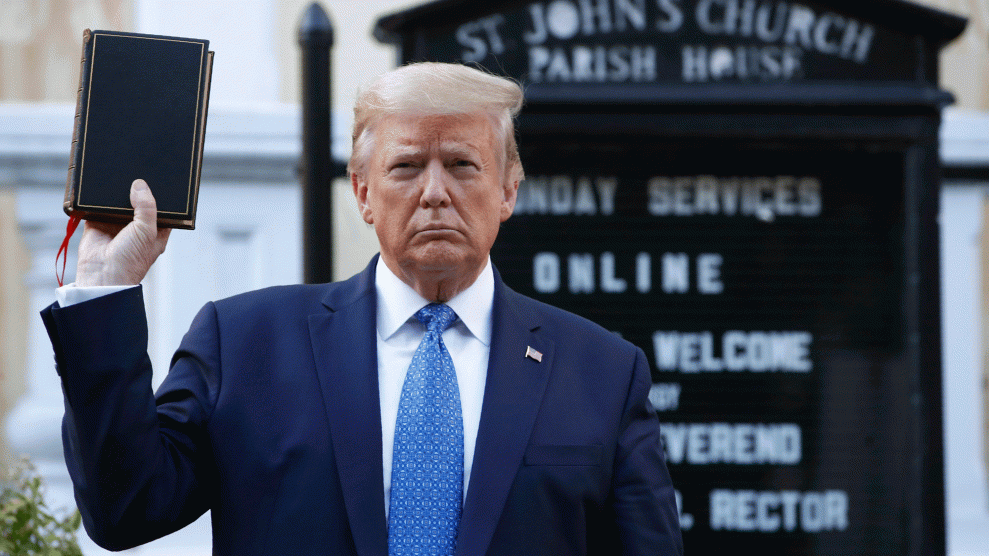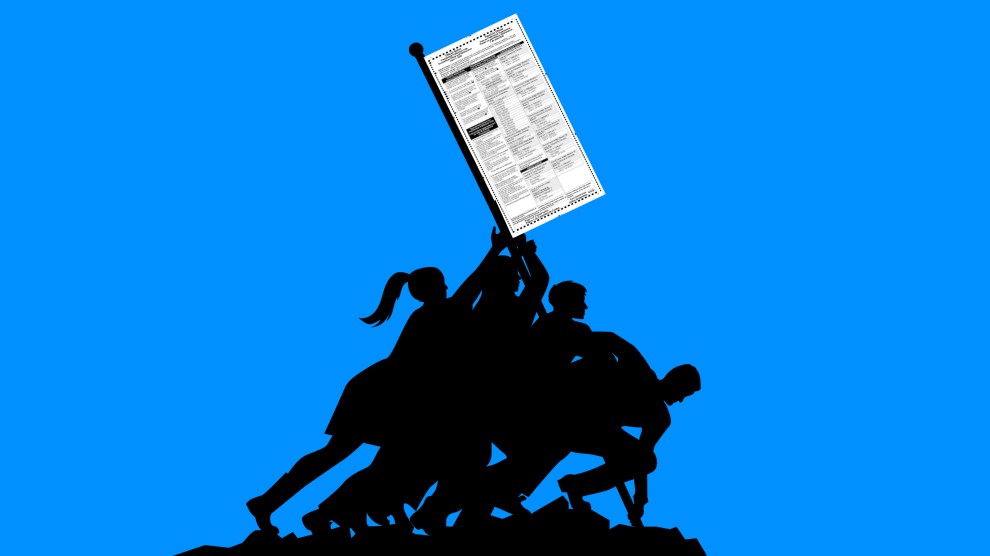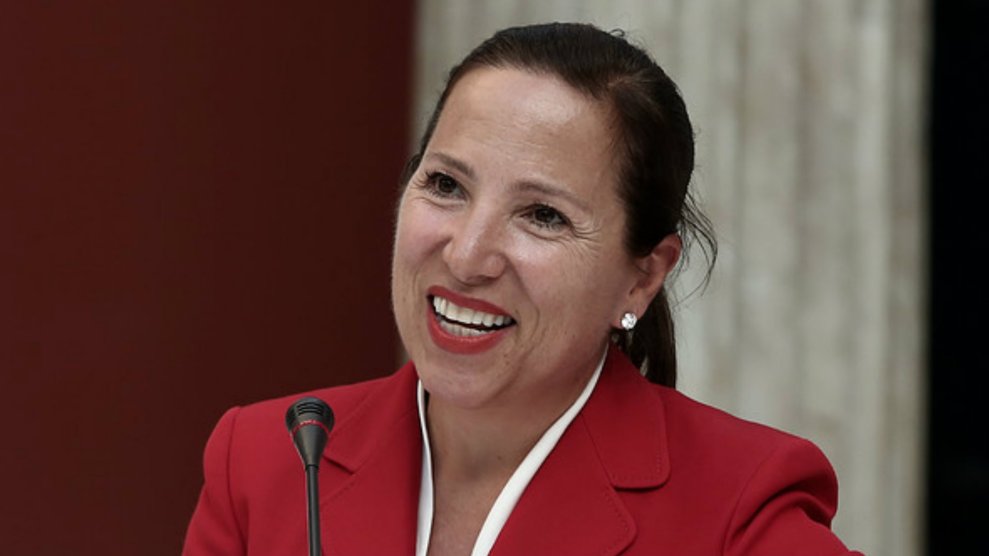
Patrick Semansky/AP
Donald Trump’s presidency has been a boon for at least one particular pocket of political science: the study of democracies and autocratic regimes. Since Trump strode into the White House and started trampling norms, there have been a flood of articles and numerous best-selling books on the fall of democracy and the rise of authoritarianism. History is indeed replete with vivid examples of the decline of democracies—and with the transition of repressive states into democracies. At one end of the spectrum, there is the Weimar Republic descending into Nazi Germany; at the other, South Africa shedding apartheid. But there is one slice of the democracy-authoritarianism dynamic that has not been examined as extensively as the clear instances of full transformation, and that subset could be particularly relevant for the United States at the present moment: democracies that slipped toward authoritarianism but recovered before it was too late.
With Trump questioning election results, attacking the free press, calling for the arrest of political opponents, violating anti-corruption safeguards, implementing nepotism, advocating measures that limit voting, seeking more control of the civil service, claiming unbridled executive power, treating the federal government (even the White House grounds) as his own private duchy, and embracing and idealizing autocrats around the world, he has prompted justified concerns about the strength of democracy within the United States. Freedom House, a nonprofit human rights watchdog that monitors democracy globally, raised questions in its 2020 annual report about American democracy: “In recent years its democratic institutions have suffered erosion, as reflected in partisan manipulation of the electoral process, bias and dysfunction in the criminal justice system, flawed new policies on immigration and asylum seekers, and growing disparities in wealth, economic opportunity, and political influence.”
Can this erosion be reversed? The road of democratic decline is not always an inevitable path that ends with a strongman regime. There have been U-turns. Some democratic nations have started falling into authoritarianism and then changed course. Two years ago, Tom Ginsburg and Aziz Huq, University of Chicago professors, looked at this question. In an article for the Journal of Democracy, they described occasions when democracies suffered “substantial yet ‘non-fatal’ deterioration in the quality of democratic institutions and then experience[d] a rebound.” These “near misses,” they noted, “have received little or no attention in the new wave of scholarship on why democracies die (or survive).”
Their article focused on three historical episodes not well-known within the United States. The first they recounted was Finland in 1930, when the right-wing mass Lapua movement that partly modeled itself on Mussolini’s movement gained influence and was welcomed by the conservative president and the ruling party, which then banned communist newspapers. This fascistic movement—which was kidnapping political opponents—fueled the election of a former prime minister, who won a close race marred by the threat of violence. “Finland appeared to be on the cusp of the sort of democratic erosion that was to engulf Germany and Austria soon thereafter,” Ginsburg and Huq wrote. “Yet Finish democracy prevailed.” Key military officials did not join the Lapua movement, and judges issued tough verdicts in response to its use of violence. Moreover, other political parties banded together across ideological lines to oppose the Lapua movement, and some conservative politicians kept their distance from it. Come March 1937, a center-left coalition was in secure control of the government.
Another near-miss: In Colombia, during the 2000s, President Alvaro Uribe tried to consolidate power for himself. He pushed for government reforms that would afford him more control and influence over the legislature and the courts. His regime waged a campaign of harassment against journalists. Ultimately, the Constitutional Court blocked his attempt to gain a third term as president. Uribe’s hand-picked successor, his defense minister, broke with him and restored the institutional status quo.
In Sri Lanka, Ginsburg and Huq pointed out, democracy was imperiled by the rise of Mahinda Rajapaksa, who won the presidency in 2005. As they put it, his “rule was marked by nepotism, corruption, and a degradation of rule-of-law institutions such as courts, prosecutors, and the police.” He appointed his three brothers to Cabinet posts and developed a cult of personality. Journalists were imprisoned and murdered. He amended the constitution so he could run for a third term in 2015. “Sri Lanka seemed on the brink of seeing its democracy totally degraded,” Ginsburg and Huq observed. But a former minister of health in Rajapaksa’s government entered the presidential race to challenge him and quickly built a coalition that triumphed. Rajapaksa considered annulling the vote but the army and police said no, as did the attorney general. Democracy was not upended. (Yet last year, one of Rajapaksa’s brothers was elected president, and his victory, according to Freedom House, “raised concerns that democratic governance and human rights conditions would again deteriorate.” Those worries were justified. This month, he enacted legislation to increase his power and weaken the parliament, prompting the opposition to warn that he was steering Sri Lanka toward autocracy.)
In each of these close calls, Ginsburg and Huq wrote, elite players were instrumental in thwarting a move toward authoritarianism: “Paradoxically, the experiences of democratic near misses that we have explored underscore the role of political elites and nonelected institutions—courts, military commanders, and election administrators—in decisively repudiating authoritarian leaders bent on democratic erosion.”
Do these examples indicate that Americans are at the mercy of the powerful and the influential when it comes to preserving democracy and combatting a Trumpian slide toward authoritarianism? Larry Diamond, a Stanford professor who co-edits the Journal of Democracy, says, “I am cautious about reasoning by comparison because the circumstances of a long-institutionalized and wealthy democracy like the United States are very different from India, for example. The plain and sobering fact of the matter is that there has never been a democracy nearly as long-established and liberal as the United States experiencing such a deep and potentially existential crisis of democracy.”
In March, Diamond and Aurel Croissant, a professor at Heidelberg University, wrote a piece on “democratic backsliding” in Asia. They contended that the current wave of “democratic recessions” around the world stands out from democratic reversals of the past: Today, democratic downturns tend to “unfold gradually” and don’t “necessarily lead to full-fledged autocracy.” They often are caused not by military coups, revolutions, or foreign intervention but by “those elected to lead a democracy,” and the assault on “political rights and civil liberties is typically related to social polarization and the mobilization of identity politics.” (Sound familiar?)
Croissant and Diamond noted that there have been at least 14 episodes of democratic decline in 10 Asian democracies since the early 2000s. In half of these, “democratic forces managed to contain the process before democracy broke down.” (This included Sri Lanka.) Pointing to the examples of South Korea (corrupt conservative presidents in the 2010s) and Taiwan (various threats to democracy, including the ruling coalition refusing to concede defeat in the 2004 presidential election), Croissant and Diamond explain that institutions of “horizontal accountability” (state actors, such as the legislatures and courts) were “least effective” and that “vertical accountability” (elections and popular action) “were more promising options of democratic resistance.” But, they added, “Asian experiences suggest that what matters most in times of democratic crisis are mechanisms of ‘diagonal accountability'”—meaning the media and civil society. “In Taiwan and Hong Kong, democracy movements driven by civic activists have played pivotal roles in forestalling backsliding or protesting against government’s ever-tightening control political space.”
What does all this mean for Americans? Trump’s assault on democratic values and methods—which has been accepted, if not embraced, by the Republican Party and tens of millions of his supporters—is not necessarily a sign the United States is on a fast track to authoritarianism. If other countries are any guide, the locomotive can be slowed and even turned around. Other nations have reached the brink and stepped back. But doing so is not easy. Ginsburg and Huq point out, “There is no single ‘magic institution’ that can be adopted to prevent democratic backsliding or to arrest it once it has begun…Sustained antidemocratic mobilization is hard to defeat.” In some instances, a small group of officials have safeguarded a democracy by openly resisting the machinations of a would-be autocrat and his henchmen. Other times, people power has fueled democracy-defending defiance. And a seeming victory may not last long. (See Sri Lanka.)
Looking for a historical comparison to apply to the present-day United States, Diamond turns to Watergate. But he acknowledges there are “big differences”: Nixon was “not as thoroughly contemptuous of democracy and democratic norms as Trump,” he possessed a “sliver of shame and of awareness of the democratic norms he was violating,” and “the Republican Party finally abandoned Nixon when the evidence showed he had gone too far.” Now, almost five decades later, the president’s party—once again, the GOP—shows little sign of abandoning Trump and his war on democracy. (Perhaps that might change, if Trump is crushed in the election.)
“This is what is so profoundly troubling to me,” Diamond says. “It’s not just Trump. You look at the widespread efforts at voter suppression, the cynical efforts [of Republicans] to create one set of rules for themselves and another for the opposition…and you see much broader abandonment of democratic norms than we saw during Watergate, when it was mainly confined to Nixon and his clique…The country faces a much more difficult and painstaking task of democratic recovery this time around.” That mission, he asserts, includes ending voter suppression, stopping felon disenfranchisement, undoing gerrymandering, reforming or ending the Electoral College, fixing broken election rules and shoddy voting systems, and much more: “Our democratic system is much more badly damaged and outmoded than it was after Watergate, and yet, even if we are so fortunate as to see the autocrat in the White House defeated and leave power, the agenda for fixing our democracy is going to be much longer and more arduous.”
There’s another thing. In assessing the experiences in Asia, Croissant and Diamond observe that for democratic resilience and resistance to triumph, “a sufficient number of citizens must still prefer a democratic form of government and have some degree of trust in democratic institutions.” Throughout his presidential campaigns and presidency, Trump has banked on the calculation that his cult of personality can overpower popular concerns about his trashing of democratic values and practices. He won that bet in 2016, and in the years since he has done much to undermine the rules of the republic. That makes the 2020 election a referendum not only on Trump but on the vitality of American democracy. The harm Trump has done is not irreversible, but the lessons from other nations show that countering this erosion will entail smart and strategic efforts on the part of those with power and of those citizens who give a damn.
















